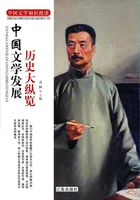She and Rodolphe had agreed that in the event of anything extraordinary occurring, she should fasten a small piece of white paper to the blind, so that if by chance he happened to be in Yonville, he could hurry to the lane behind the house. Emma made the signal; she had been waiting three-quarters of an hour when she suddenly caught sight of Rodolphe at the corner of the market. She felt tempted to open the window and call him, but he had already disappeared. She fell back in despair.
Soon, however, it seemed to her that someone was walking on the pavement. It was he, no doubt. She went downstairs, crossed the yard. He was there outside. She threw herself into his arms.
"Do take care!" he said.
"Ah! if you knew!" she replied.
And she began telling him everything, hurriedly, disjointedly, exaggerating the facts, inventing many, and so prodigal of parentheses that he understood nothing of it.
"Come, my poor angel, courage! Be comforted! be patient!"
"But I have been patient; I have suffered for four years. A love like ours ought to show itself in the face of heaven. They torture me! I can bear it no longer! Save me!"
She clung to Rodolphe. Her eyes, full of tears, flashed like flames beneath a wave; her breast heaved; he had never loved her so much, so that he lost his head and said "What is, it? What do you wish?"
"Take me away," she cried, "carry me off! Oh, I pray you!"
And she threw herself upon his mouth, as if to seize there the unexpected consent if breathed forth in a kiss.
"But--" Rodolphe resumed.
"What?"
"Your little girl!"
She reflected a few moments, then replied--
"We will take her! It can't be helped!"
"What a woman!" he said to himself, watching her as she went. For she had run into the garden. Someone was calling her.
On the following days Madame Bovary senior was much surprised at the change in her daughter-in-law. Emma, in fact, was showing herself more docile, and even carried her deference so far as to ask for a recipe for pickling gherkins.
Was it the better to deceive them both? Or did she wish by a sort of voluptuous stoicism to feel the more profoundly the bitterness of the things she was about to leave?
But she paid no heed to them; on the contrary, she lived as lost in the anticipated delight of her coming happiness.
It was an eternal subject for conversation with Rodolphe. She leant on his shoulder murmuring--
"Ah! when we are in the mail-coach! Do you think about it? Can it be? It seems to me that the moment I feel the carriage start, it will be as if we were rising in a balloon, as if we were setting out for the clouds. Do you know that I count the hours? And you?"
Never had Madame Bovary been so beautiful as at this period; she had that indefinable beauty that results from joy, from enthusiasm, from success, and that is only the harmony of temperament with circumstances. Her desires, her sorrows, the experience of pleasure, and her ever-young illusions, that had, as soil and rain and winds and the sun make flowers grow, gradually developed her, and she at length blossomed forth in all the plenitude of her nature. Her eyelids seemed chiselled expressly for her long amorous looks in which the pupil disappeared, while a strong inspiration expanded her delicate nostrils and raised the fleshy corner of her lips, shaded in the light by a little black down. One would have thought that an artist apt in conception had arranged the curls of hair upon her neck; they fell in a thick mass, negligently, and with the changing chances of their *****ery, that unbound them every day.
Her voice now took more mellow infections, her figure also; something subtle and penetrating escaped even from the folds of her gown and from the line of her foot. Charles, as when they were first married, thought her delicious and quite irresistible.
When he came home in the middle of the night, he did not dare to wake her. The porcelain night-light threw a round trembling gleam upon the ceiling, and the drawn curtains of the little cot formed as it were a white hut standing out in the shade, and by the bedside Charles looked at them. He seemed to hear the light breathing of his child. She would grow big now; every season would bring rapid progress. He already saw her coming from school as the day drew in, laughing, with ink-stains on her jacket, and carrying her basket on her arm. Then she would have to be sent to the boarding-school; that would cost much; how was it to be done?
Then he reflected. He thought of hiring a small farm in the neighbourhood, that he would superintend every morning on his way to his patients. He would save up what he brought in; he would put it in the savings-bank. Then he would buy shares somewhere, no matter where; besides, his practice would increase; he counted upon that, for he wanted Berthe to be well-educated, to be accomplished, to learn to play the piano. Ah! how pretty she would be later on when she was fifteen, when, resembling her mother, she would, like her, wear large straw hats in the summer-time; from a distance they would be taken for two sisters.
He pictured her to himself working in the evening by their side beneath the light of the lamp; she would embroider him slippers; she would look after the house; she would fill all the home with her charm and her gaiety. At last, they would think of her marriage; they would find her some good young fellow with a steady business; he would make her happy; this would last for ever.
Emma was not asleep; she pretended to be; and while he dozed off by her side she awakened to other dreams.















